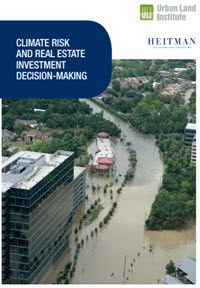A recent report from the Urban Land Institute (ULI) and Heitman LLC explores current methods for assessing and mitigating climate risk in real estate.
- Climate Risk and Real Estate Investment Decision-Making concludes, "An eventual downward repricing of higher-risk assets will be the market's way of redirecting capital to locations and individual assets where it is expected to be better insulated from these particular risks. This process will be painful for investors who are caught off guard, but those who are prepared have the potential to outperform." (CNBC, April 9 and ULI news release, Feb. 5 )
- The New York City Council this week approved a set of bills that set greenhouse gas (GHG) emission caps for many different types of buildings, along with fines for those who do not meet the caps. (New York Times, April 17 and Politico Pro, April 18)
- Real Estate Board of New York (REBNY) President John Banks responded that the organization is fully supportive of the City's carbon emission goals, but the Council is leading New York in the wrong direction. "The legislation is not an energy efficiency measure. With so many exemptions and carve-outs, we will be confronted with the fact that our city is off-track from meeting its ambitious 40 percent carbon reduction goal by 2030," Banks said. (REBNY, April 16 and April 18)
- Commercial building owners and operators, including several members of The Real Estate Roundtable, were recognized last week at the annual ENERGY STAR Awards for demonstrating national leadership in cost-saving energy efficient solutions. The U.S. Environmental Protection Agency and the U.S. Department of Energy awarded 183 ENERGY STAR partners for their outstanding contributions to public health and the environment. The award winners also include Fortune 500 companies, schools, retailers, manufacturers and home builders. (EPA news release, April 9)
- The Roundtable and its Sustainability Policy Advisory Committee (SPAC) continue to work with lawmakers on sound policy issues that promote energy efficiency – not only to achieve better building performance, but to spur innovation, create construction jobs that cannot be exported, and enhance the country's energy security through a more resilient building stock. (The Roundtable's 2019 Policy Agenda Energy Section)
In this session of the U.S. Congress, climate-related policy is expected to play a role in any major tax, infrastructure, energy, or disaster-relief legislation, as the political parties seek to stake out their respective positions before the 2020 election. (Stanford News, April 17)
